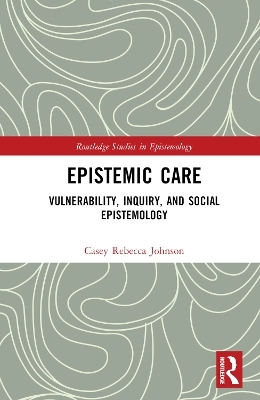
Epistemic Care
Vulnerability, Inquiry, and Social Epistemology
Seiten
2023
Routledge (Verlag)
978-0-367-47329-7 (ISBN)
Routledge (Verlag)
978-0-367-47329-7 (ISBN)
This book uses the framework of care ethics to articulate a novel theory of our epistemic obligations to one another. It presents an original way to understand our epistemic vulnerabilities, our obligations in education, and our care-duties toward others with whom we stand in epistemically vulnerable relationships.
This book uses the framework of care ethics to articulate a novel theory of our epistemic obligations to one another. It presents an original way to understand our epistemic vulnerabilities, our obligations in education, and our care duties toward others with whom we stand in epistemically vulnerable relationships.
As embodied and socially interdependent knowers, we have obligations to one another that are generated by our ability to care – that is, to meet each other’s epistemic vulnerabilities. The author begins the book by arguing that the same motivations that moved social epistemologists away from individualistic epistemology should motivate a move to a care-based theory. The following chapters outline our epistemic care duties to vulnerable agents, and offer criteria of epistemic goodness for communities of inquiry. Finally, the author discusses the tension between epistemic care and epistemic paternalism.
Epistemic Care will be of interest to scholars and advanced students working in social epistemology, ethics, feminist philosophy, and philosophy of education.
This book uses the framework of care ethics to articulate a novel theory of our epistemic obligations to one another. It presents an original way to understand our epistemic vulnerabilities, our obligations in education, and our care duties toward others with whom we stand in epistemically vulnerable relationships.
As embodied and socially interdependent knowers, we have obligations to one another that are generated by our ability to care – that is, to meet each other’s epistemic vulnerabilities. The author begins the book by arguing that the same motivations that moved social epistemologists away from individualistic epistemology should motivate a move to a care-based theory. The following chapters outline our epistemic care duties to vulnerable agents, and offer criteria of epistemic goodness for communities of inquiry. Finally, the author discusses the tension between epistemic care and epistemic paternalism.
Epistemic Care will be of interest to scholars and advanced students working in social epistemology, ethics, feminist philosophy, and philosophy of education.
Casey Rebecca Johnson is an assistant professor at the University of Idaho, USA. Her research focuses on the effects of social position and power on knowers' ability to do what they want with their words and their knowledge. She edited the volume Voicing Dissent (Routledge, 2017).
1. Epistemic Interdependence 2. Communities of Inquiry 3. Epistemic Vulnerability 4. Evaluating Communities of Inquiry 5. Epistemic Maternalism
| Erscheinungsdatum | 08.02.2023 |
|---|---|
| Reihe/Serie | Routledge Studies in Epistemology |
| Verlagsort | London |
| Sprache | englisch |
| Maße | 152 x 229 mm |
| Gewicht | 426 g |
| Themenwelt | Geisteswissenschaften ► Philosophie ► Erkenntnistheorie / Wissenschaftstheorie |
| Geisteswissenschaften ► Philosophie ► Ethik | |
| Sozialwissenschaften ► Pädagogik ► Allgemeines / Lexika | |
| Sozialwissenschaften ► Pädagogik ► Bildungstheorie | |
| ISBN-10 | 0-367-47329-1 / 0367473291 |
| ISBN-13 | 978-0-367-47329-7 / 9780367473297 |
| Zustand | Neuware |
| Haben Sie eine Frage zum Produkt? |
Mehr entdecken
aus dem Bereich
aus dem Bereich
die Grundlegung der modernen Philosophie
Buch | Softcover (2023)
C.H.Beck (Verlag)
18,00 €
Buch | Softcover (2023)
Reclam, Philipp (Verlag)
7,00 €


![Was heißt Denken?. Vorlesung Wintersemester 1951/52. [Was bedeutet das alles?] - Martin Heidegger](/media/113619842)